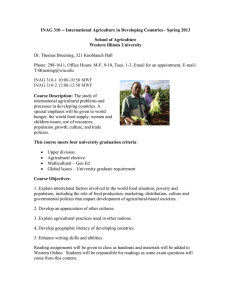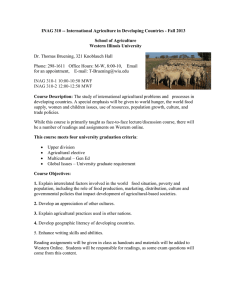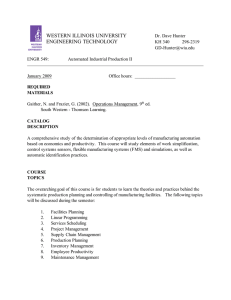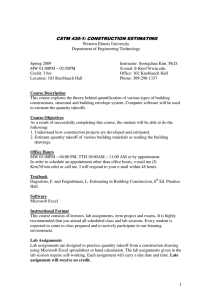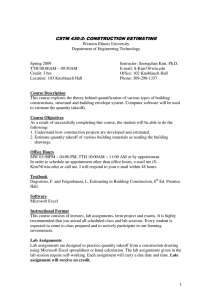INAG 310 -- International Agriculture in Developing Countries – Spring... School of Agriculture Western Illinois University
advertisement
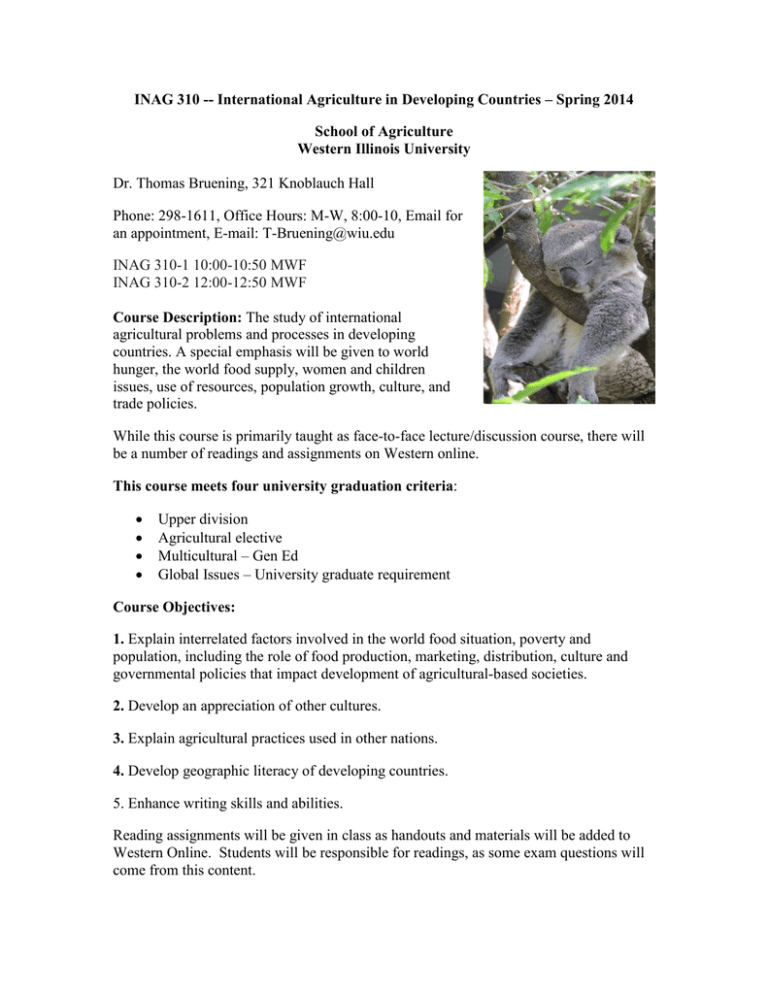
INAG 310 -- International Agriculture in Developing Countries – Spring 2014 School of Agriculture Western Illinois University Dr. Thomas Bruening, 321 Knoblauch Hall Phone: 298-1611, Office Hours: M-W, 8:00-10, Email for an appointment, E-mail: T-Bruening@wiu.edu INAG 310-1 10:00-10:50 MWF INAG 310-2 12:00-12:50 MWF Course Description: The study of international agricultural problems and processes in developing countries. A special emphasis will be given to world hunger, the world food supply, women and children issues, use of resources, population growth, culture, and trade policies. While this course is primarily taught as face-to-face lecture/discussion course, there will be a number of readings and assignments on Western online. This course meets four university graduation criteria: Upper division Agricultural elective Multicultural – Gen Ed Global Issues – University graduate requirement Course Objectives: 1. Explain interrelated factors involved in the world food situation, poverty and population, including the role of food production, marketing, distribution, culture and governmental policies that impact development of agricultural-based societies. 2. Develop an appreciation of other cultures. 3. Explain agricultural practices used in other nations. 4. Develop geographic literacy of developing countries. 5. Enhance writing skills and abilities. Reading assignments will be given in class as handouts and materials will be added to Western Online. Students will be responsible for readings, as some exam questions will come from this content. Date Topics Assignments 1/13 M Introduction to the course, assignments and expectations 1/15 W International agricultural education defined, importance of International Agriculture Education and topics – 1/17 F International agricultural education concept map 1/20 M NO Class Dr. Martin L. King - Day 1/22 W Why is International Agriculture Important? Rural development North/South Explain the difference between North and South countries. 1/24 F Identification of developing countries and their problems Identify and explain the Millennial development goals. WO activity – read and answer questions 1/27 M World Food Supply 1/29 W Problems with Basic Education Identify the impact of world drought and food distribution issues. Explain the issues with basic education in developing countries. 1/31 F Rural Poverty- The Power of the Poorvideo Impact of poverty on development Identify and explain the barriers that rural poor must overcome to join the “normal” economy. Complete online activity. 2/3 M Empowerment of Women Access to credit/information Explain how women have been excluded from educational opportunities and access to credit. Review concept map and explain interrelationship of development themes. 2 2/5 W Rural Chinese Women’s Development Identify and explain the role of culture and tradition in women’s development. 2/7 F Australian Development Compare and contrast agriculture in Australia and the US 2/10 M Malnutrition Explain the role of nutrition in development. 2/12 W President Lincoln’s Birthday – No Class 2/14 F Farmer first research – needs identification Chambers Chapter 1. – R. Chambers Explain how needs of farmers could be identified WO activity – read and answer questions Farmer first research – needs identification What did you learn about discussion farmer needs? 2/17 M 2/19 W International Trade – the big picture 2/21F Agriculture Innovation Prize 2//24 M Exam 1 2/26 W Country Reports – groups will select specific countries 2/28 F Country Reports 3/3 M Country Reports 3/5 W Country Reports 3/7 F Why Seasons Matter 3/10-3/14 (M-F) SPRING BREAK – NO CLASS 3/17 M Farmer First 3/19 W Development in Brazil 3/21 F Study abroad What are the trends in international trade? Small group presentations Chapter 4 Chambers. WO activity – read and answer questions Chapter 5 Chambers. WO activity – read and answer questions Identify key ag development opportunities What opportunities exist for students at WIU? 3 3/24 M Aid – NGO’s role 3/26 W Career opportunities in international agriculture 3/28 F International Trade – basics Identify importance of international trade 3/31 M Keys to Ag Development or Extension education 4/2 W Peace Corps Identification of strategies that will aid development or compare and contrast extension education across the world. What is the impact of Peace Corps efforts? 4/4F Exam II 4/7 M Culture 4/9 W Culture 4/11 F Culture 4/14 M Technology in development 4/16 W Water resources in development – issues of sanitation – Western online activity 4/18 F Green Revolution - Western online activity 4/21 M Development in Russia 4/23 W World Hunger What is a NGO and how to they help with development efforts? Identify and develop a narrative – instructor option for points What’s your culture and its role? Explain the importance of technology in development. Explain efforts to improve the water quality and access to high quality water. Complete worksheet and submit to drop box Explain the importance of green revolution in developing countries. Complete worksheet and submit to drop box Explain how agriculture has changed in the postSoviet society. Explain the impact of poverty in developing 4 countries. 4/25 F Resources – Micro credit 4/28 M Development in China 4/30 W Development in Africa 5/2 F Water quality and issues of sanitation in the developing world – video 5/5 M Final Exam Explain how microcredit aids development efforts. Complete worksheet and submit to drop box Compare and contrast agriculture in various regions of China. Compare and contrast agriculture in various regions of South Africa. Final Exam -- Monday, 5/5/14, 10:00 class at 10:00, 12:00 class at 1:00 PM Grading Scale A 100 - 92% A- 91 - 90% B+ 89 - 88% B 87 - 82% B- 81 - 80% C+ 79 - 78% C 77 - 72% C- 71 - 70% D+ 69 - 68% D 67 - 62% D- 61 - 60% F <60% Grades Based On: Evaluation Exam 1 Exam 2 Final Exam (comphensive) Special assignment (instructor option) Country presentation Quizzes possible (2 – 10 points) Attendance and Participation Homework/assignments (10-20 points each) Total Points possible 50 50 100 25 Your score 55 0-20 50 50 - 100 380 - 450 Quizzes: unannounced quizzes could be worth 10 pts. each (instructor’s option). 5 Homework/assignments will be given for specific online activities. Students will need to complete by the announced deadlines to receive full credit for the activity. Please contact WIU computer support for help logging into Western Online. For this course you will need to have access to high speed internet for some of the content. Attendance will be taken in class. Students (excused and unexcused) that miss class six or more sessions (excused and unexcused) will not be allowed to participate in extra credit and/or grade adjustments that could occur in class. Don’t come to class and sleep – sleeping in class will be counted as an absence and nonparticipation and you could be asked to leave. Failure to complete an online activity is equal to missing class. Country Report -- Information will be available at the Western Online class page regarding how to complete the country report. Additional Reading: Additional outsideclass reading material may be assigned on the Western Online page or given as handouts in class. Special assignment (instructor option)– students will be asked to develop a project. Extra Credit: Extra Credit will be available only as follows (one of four options): 1. Attending a pre-approved International presentation with write-up/summary -- 15 pts. /session possible, 30 total maximum points (two extra credit activities). Please see online module explaining how to develop a two-page narrative. 2. Other specific events that will arise on campus, as approved by the instructor 3. Extra credit assignments must be handed in within a week of the presentation for credit to be given. 4. A book list will be provided and students may at the permission of the instructor, read and then give a book report. An extensive book report/critical review format needs to be followed and this book cannot be used in another class for a book report (total of 30 points possible – book reports must be from approved list and are due no later than 4/18/14). Course polices: Excuses: Any excuse for a missed test or assignment must be cleared before the assignment is due or test is to be taken. In general, the only accepted excuses will be for pre-excused official university events, personal health if a doctor's excuse is available, and verifiable family emergencies. All cell phones must be shut off when in class and put away. A deduction of 10 points will be made for each cell phone call/text message made or received in class. Plagiarism will be grounds for failing the course. See WIU's policy at: http://www.wiu.edu/policies/acintegrity.php Sections of the class are not interchangeable. If you cannot attend your section, it is not possible to attend the other section without instructor approval. 6 Hats and caps will not be worn in class when presentations are given – points will be deducted for failure to follow this policy. Each student needs to review the information at: http://www.wiu.edu/policies/acintegrity.php Schedule: The instructor reserves the right to change topics to fit the needs of the students and or to accommodate the teaching schedule. Some additional online assignments could be given in the course (this is why the total points varies). Staplers: Assignments with multiple pages will have five points deducted if not stapled together. I do not have a stapler that you can use. Attention Education Majors: The changes within the state certification requirements, which go into effect immediately for all of those students who graduate in the spring 2012 and after, you are required to receive a grade of a "C" or better in this course in order to meet these new requirements. With the new university +/- grading system, receiving a "C-" or below will require you to retake this course or find a substitute course to meet School of Agriculture graduation requirements. In accordance with University policy and the Americans with Disabilities Act (ADA), academic accommodations may be made for any student who notifies the instructor of the need for an accommodation. For the instructor to provide the proper accommodation(s) you must obtain documentation of the need for an accommodation through Disability Resource Center (DRC) and provide it to the instructor. It is imperative that you take the initiative to bring such needs to the instructor’s attention, as he/she is not legally permitted to inquire about such particular needs of students. Students who may require special assistance in emergency evacuations (i.e. fire, tornado, etc.) should contact the instructor as to the most appropriate procedures to follow in such an emergency. Contact Disability Resource Center (DRC) at 298-2512 for additional services. OARS – students are encouraged by the university to use OARS to document missing of class. Using this system does not reduce your responsibility to complete assignments or the content that you missed. Students need get notes, handouts and content information from classmates. oars@wiu.edu 7
